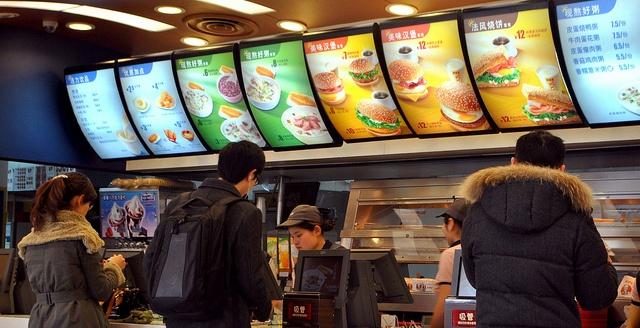
I visited China for the first time in 1996. Beijing still had blue skies back then, but its boom was evident as cranes hovered all over the city. Of course I saw all the sights, but I avoided Mao Zedong’s mausoleum because of my views about his impact on China’s history. I figured the best way to honor the founder of modern China was to celebrate China’s embrace of capitalism and have lunch at the KFC across the street from his tomb.
What I witnessed in that KFC, and at other fast-food joints such as McDonald’s over the years, was a fascinating yet disturbing view on Chinese society. For a generation fast food was seen as hip, fashionable and forward-thinking in China. And considering what many older Chinese endured through the country’s history, such as the “Great Leap Forward” and the “Cultural Revolution,” why not hang out in a fast-food restaurant? They were convivial, modern, brightly lit, air conditioned and welcoming to everyone.
But the scenes I saw in these restaurants were also worrisome. A child would be surrounded by his parents and both sets of grandparents, along with extended family, competing for that kid’s attention with copious helpings of hamburgers, fries, fried chicken and other fast-food delicacies. And many those kids, who were overwhelmingly boys — due to the Chinese preference for boys in a society in the midst of the second decade of its one-child policy — were already obese. The result is a proliferation of “fat camps” across the country as China’s rapid accumulation of wealth is in part behind its people’s own battle of the bulge. The problem is more obvious in China’s wealthier cities, but now media outlets are reporting an increase in obesity in rural areas, too.
But China may have passed the tipping point with its 25-year fast food obsession. A 2016 McKinsey report suggests that Western fast food is on the decline in China. Carbonated soft drinks and ice cream have also decreased in popularity since 2012, suggesting that Chinese consumers are seeking a healthier lifestyle.
In 2012, two-thirds of Chinese surveyed said they regularly eat fast food; this year that rate fell to 51 percent. Consumers who said they drink carbonated beverages peaked at 84 percent four years ago and has since dropped to 63 percent. The only food product that reported a slight uptick in the past few years is juice, with a modest increase of 2 percent. Meanwhile, more Chinese consumers are seeking organic food products, while 50 percent surveyed said they are focused on eating more healthful and nutritious foods.
Part of this change emanates from the food scandals that rocked China over the past decade. Scandals involving rotten products used in food processing, meat so pumped with chemicals it turned bright blue, and even reports of cooking oil sourced from sewage have spooked many Chinese consumers. Food scandals involving tainted and expired meat also hit fast food companies hard, including McDonald’s and KFC. As a result, McKinsey reports that 72 percent of Chinese consumers are more concerned about their food supply’s impact on public health, up 60 percent from 2012.
These shifts in the world’s most populous country are worrisome for the world’s largest fast-food companies, which have long relied on growth overseas while sales stalled, and even declined, here in the U.S. But this survey also offers opportunities to companies that can find a way to sell healthier and more sustainable food to China’s 1.36 billion people, as the McKinsey report also suggests that the Chinese are become more loyal to their favorite brands.
Image credit: China Supertrends/Flickr

Leon Kaye has written for 3p since 2010 and become executive editor in 2018. His previous work includes writing for the Guardian as well as other online and print publications. In addition, he's worked in sales executive roles within technology and financial research companies, as well as for a public relations firm, for which he consulted with one of the globe’s leading sustainability initiatives. Currently living in Central California, he’s traveled to 70-plus countries and has lived and worked in South Korea, the United Arab Emirates and Uruguay.
Leon’s an alum of Fresno State, the University of Maryland, Baltimore County and the University of Southern California's Marshall Business School. He enjoys traveling abroad as well as exploring California’s Central Coast and the Sierra Nevadas.














